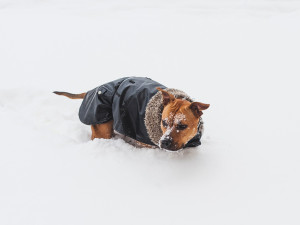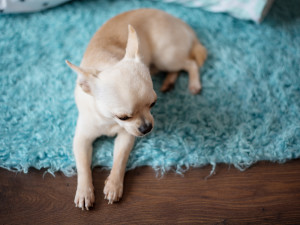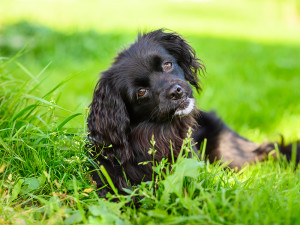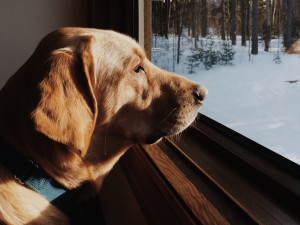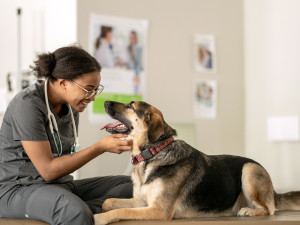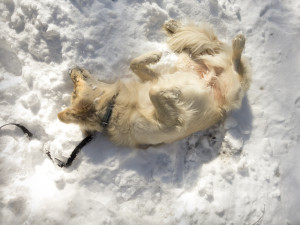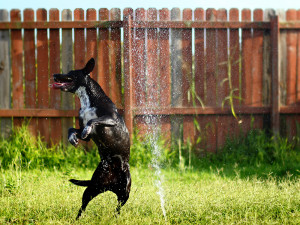How to Teach Your Dog to Poo in the Snow
Snow days are fun – until your pup needs to do their thing outside
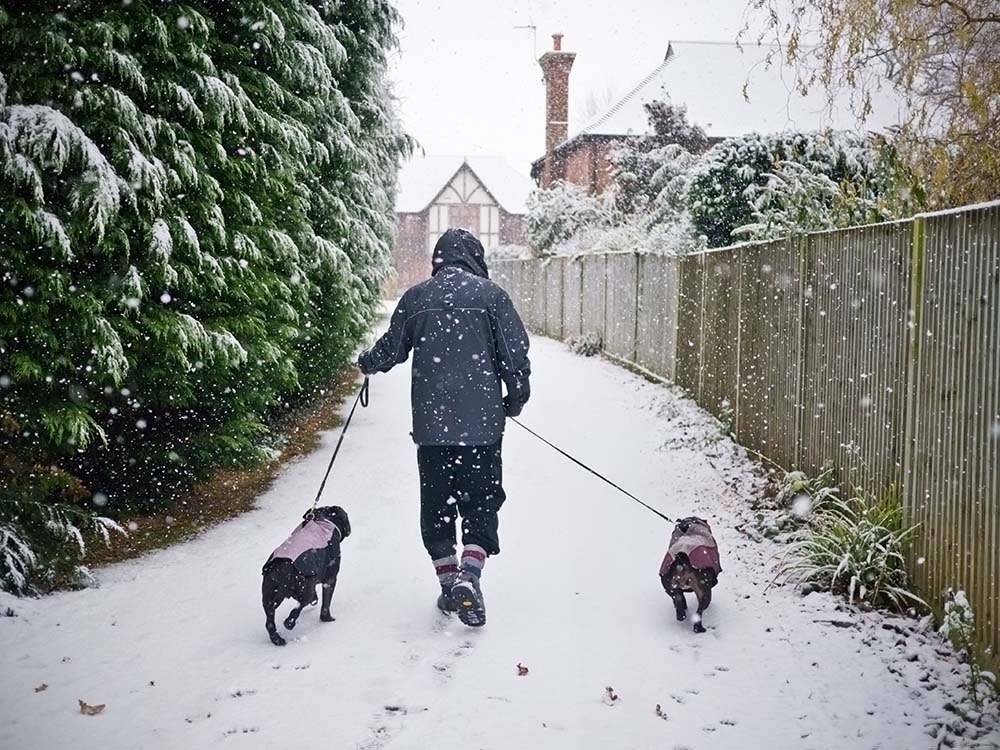
Share Article
In this article:
Why do dogs hate pooping in the snow?opens in new tab Tips to help dogs poo in snowopens in new tab How to train your dog to poo in the snowopens in new tab How cold is too cold for my dog to poo outside?opens in new tab
The world is divided into people whose dogs absolutely love everything about snow and people whose dogs don’t want to poo in snow, thus making winter a horribly stressful and annoying season. The problem has been magnified lately because we’re in another winter of wild weather. Whilst most of the UK has seen gale-force winds and sub-zero temperatures, many of us are facing giant snowstorms, too.
The shovelling, road conditions and heating bills are bad enough, but this no-that’s-not-the-bathroom-anymore attitude of dogs across the nation and beyond is making snow Enemy Number One. If you have found yourself in the garden saying with despair, “Oh for the love of god will you please just do a poo?” you may want to come inside, yank off your boots and read a bit about how to make this snowy winter easier on you and your dog.
Why do dogs hate pooing in the snow?
If your dog refuses to poo in snow (or pee), it’s natural to feel frustrated and annoyed. You’re frustrated because you are spending a lot of time outside trying to get your dog to poo when you could be inside with hot cocoa, happily enjoying the winter wonderland from the cosiness of your favourite chair. You’re annoyed because cleaning up poo and wee when your dog has been properly housetrained for years is annoying (and maddening and gross, and unfair, and... you get the idea.)
Everybody has a perfect right to feel how they feel, but I must put in a word for our dogs here and suggest that another worthwhile way to feel is sympathetic. When a dog doesn’t want to poo in the snow, it’s not because they are being difficult. This situation is a classic example of a dog who is having a hard time rather than a dog who is giving you a hard time. They are most likely confused or uncomfortable, and they need our help.
Puppies are used to whatever surface they were trained on – grass, leaves, concrete or pee pads – and will likely prefer that for the rest of their life. When dogs encounter snow for the first time, they often just don’t know that it is OK to pee or poo on it. So, while raising a puppy in the dead of winter has its challenges (read: miseries), those who learn their housetraining skills at this time are less likely to balk at the snow each season. Clearly a lot of dogs make sense of snow either right away or eventually. Otherwise, yellow snow would not be a thing.
Sensory discomfort in the snow
The issue of discomfort is a little more obvious – snow is cold. There’s the cold winter air itself and the cold snow which doesn’t feel good on their paws (or on their legs or bellies). If your dog is unfamiliar with snow, it’s not a fun feeling. Dogs who get cold easily (I relate to the ones who shiver when it drops below 15C) aren’t always fans of the cold under any circumstances, but can barely keep their heads above all the fluffy white stuff after a blizzard. It’s understandable that they would be particularly resistant to head out at all – and unable to relax enough to do their business once they do.
And if their fur traps snowballs on their feet, legs and belly, they have every reason to object when we expect them to endure that. Individual dogs vary in their ability to handle cold, but generally speaking, small and slender ones with short fur suffer the most.
Tips to help your dog poo in the snow
Sometimes it’s the little things – just a few tweaks and your dog is back to business (literally). In other cases, a touch more effort may be needed, but all these tips have been successful for many people and their dogs.
1. Make the great outdoors more welcoming
One method is to shovel a pathway from the door to the toilet area – a patch of grass or, better yet, a spot protected from the snow, such as under a balcony or away from the wind. Most dogs are more likely to do their business if a snow-free zone is easily accessible to them so that they can quickly rush back indoors.
Also, if the area smells more like what they are used to, it is easier for them to poo like they usually do. Keep up with the poo pick-up – daily poo pick-up is more important than ever during this season. Using kitty litter on the ground can provide pups with better traction when things get slippery.
2. Be a storm trooper, and join your dog outside in the snow
Some dogs have shy bladders, but others will appreciate a show of solidarity. You may not want to accompany your dog out in freezing temperatures, but you may also find that it leads to success. It could take several outings, though – if 5–10 minutes have gone by and your dog still hasn’t gone, bring them back inside, but on a lead so they can’t sneak off behind your back.
Though this method takes considerable effort, it does work for most dogs. Some dogs struggle when their garden is blanketed with snow but are more inspired to go to the bathroom on walks around the neighbourhood. Leading your dog to areas where other dogs have already gone (seek out that yellow snow) may encourage your dog, too.
3. Dress your dog for success (in warm clothes)
Dressing for success is not just a business idea. It applies to everything in life; it includes our dogs, and it can be the difference maker when it comes to convincing them to go to the toilet outside, just as they do in the summer. Sometimes the reason a dog won’t go when it’s cold is not about the snow at all. Some dogs won’t poo in cold weather, even if the ground is dry. They are happy to remain where it’s warm and stay occupied inside, thank you very much, and the result is a dog who poos inside when the weather is cold.
Canine coats are functional, as well as fashionable. Putting socks, booties or boots on your dog’s feet can be the difference-maker in some cases. Dressing your dog for winter weather can make them more comfortable and more willing to head outside. Warm-weather clothing may make them willing to stay outside long enough to take care of business. I myself never go outside in the most foul of winter weather without properly suiting up.
4. It’s a poo tent, not a pup tent
A snow ‘poo tent’ for the dog can make everybody’s life easier. If you didn’t know you needed a dog snow poo tent, well, now you do. It’s exactly what it sounds like – a tent that protects the ground from the snow so there is still a grass or dirt area that your dog can use as a toilet during winter.
Using a sports pop-up tent can work, especially if you use plywood to make sides that keep snow from blowing in. You can use an old camping tent with the floor removed, or build your own out of whatever materials you want. As long as the area is protected from snow, and there is no floor to it so your dog can smell the great outdoors, a dog snow pop tent may be the solution you need. Some dogs walk to the poo tent to go, and others get carried – whatever works for you.
5. Hay, straw or a carpet – comfort leads to pooping
For dogs who don’t want to walk on snow or are otherwise uncomfortable using the yard in the winter, try changing the surface for them. Putting down hay or straw is enough to help some dogs overcome their anti-poo protest.
Other dogs do well if you put out an old carpet remnant on top of the snow. Anything to make it more comfortable for the season is worth trying. The straw can be left in the yard, but the carpet remnant is something I would pitch once springtime comes. It’s hard to clean it after a season of being out in the elements and being pooed on.
Training your dog to poo in the snow
If you want to know how to get dogs to poo (and pee) in the snow, don’t forget the obvious. Training your dog makes the behaviour you want more likely to happen, so training your dog to poo and go for a wee in the snow is an important piece of the puzzle. But training will be so much more effective if you start early, long before you look outside and see a winter wonderland that you didn’t ask for and you know your dog could do without.
When it snows, go back to a housetraining 101 approach. Take your dog out when there is just the smallest hint of snow (I know, it’s hard to coordinate with Jack Frost, but do your best) and encourage them to do their business. You can encourage a dog to poo by taking them to a spot they usually like to use, give them the cue you taught them, and wait. Patience is important.
When they do go, give them top-quality treats, and be generous with them. Every chance you get to have them be in light snow is an opportunity to teach them that the snow is not covering the toilet; the snow is the toilet. Take them into the garden and on walks to pee and poo – flexibility about bathrooms is the goal! As the snow accumulates, you may need to clear a path or area for their business, depending on their size and their changing attitude toward pooing in the snow.
How cold is too cold for my dog to poo outside?
We all want our dogs to be safe in the snow and cold. There are temperatures too low for dogs to be outside safely, but those vary for every dog. The average Husky will be able to handle winter weather without risking frostbite, unlike the average Basenji, but it’s wise to ask your vet about limitations for your particular dog. And temperatures that are too low for an all-day adventure or even a 45-minute walk may not be too cold for a quick visit outside to pee and poo.
The temperature at which your dog cries foul about having to go to the toilet outside, however, is entirely up to them. They have the final say on when it is too cold for a dog to poo outside without your help. It doesn’t matter what other experts might say. In this case, your dog has the only expert opinion on the subject that really matters. They know when it is too cold for a dog to poo outside, and you can figure it out because they may refuse to go into the garden at all, or you may find you have a dog pooing in the house in cold weather.
Frequently asked questions
What is the best way to clean up dog poo in the snow?
It’s better to scoop poo right away before it freezes in the snow and becomes a gross spring thaw situation. The best way to pick up dog poo in snow is the same as in warmer seasons – with a plastic poo bag or a shovel.
Why do dogs cover their poo with snow?
Theories about why dogs cover their poop with snow include concealing their scent from rivals. Another possibility is they are pawing at the ground to mark the spot with glands in their paws rather than actually trying to bury their poo.
Are specific breeds less likely to want to poo in the snow?
Dogs who are sensitive to cold are less likely to want to poo in the snow. Dogs who are small, have short legs, are slender or who have short fur are generally more common in the anti-snow pooers group.

Karen B. London, PhD, CAAB, CPDT-KA
Karen B. London, Ph.D., is a Certified Applied Animal Behaviorist and Certified Professional Dog Trainer who specializes in working with dogs with serious behavioral issues, including aggression, and has also trained other animals including cats, birds, snakes, and insects.
Related articles
![Dog looking out a window in the winter]()
Can Your Dog Suffer From Seasonal Depression?
Here’s why dogs may suffer from seasonal affective disorder, too
![vet smiling at dog]()
A Vet Explains How To Keep Your Pet’s Medical Bills Low This Winter
As a vet working in emergency practice, I often see cases where these bills could be reduced or avoided altogether
![Winterizing your dog's coat - Dog laying in the snow.]()
Natural Remedies for Dry Skin: How to Help Dry Skin on Dogs
Spoiler: the ingredients are probably already in your cupboard
![Dog-friendly backyard, dog playing in the sprinkler]()
6 Ways to Make Your Back Garden a Canine Paradise
Paddling pools aren’t just for kids

